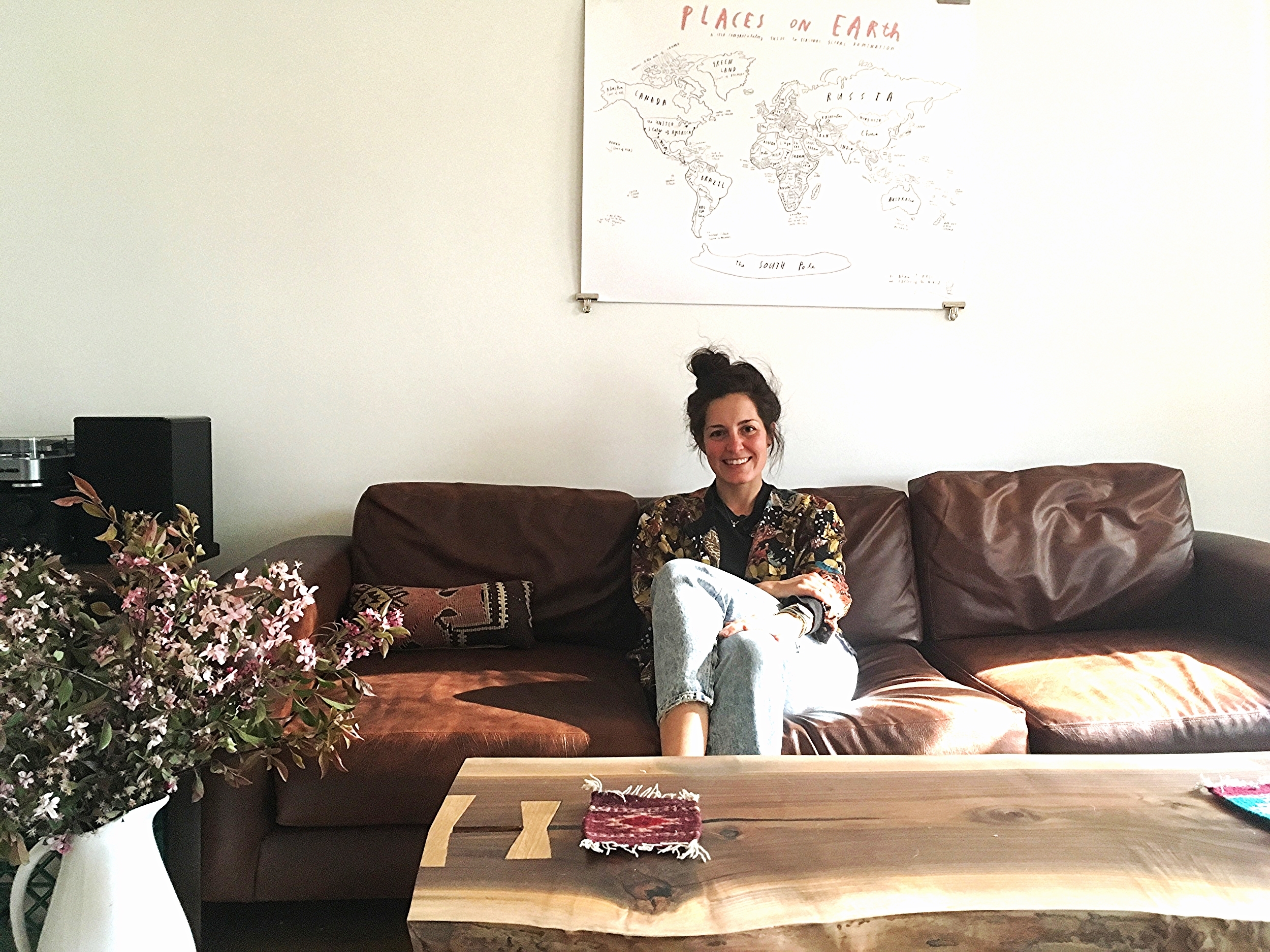MF Editor Note: Kris De La Torre is an urban farmer and educator. She has taught classes on nutrition and sustainability around the world and apprenticed with Dan Barber at Blue Hill at Stone Barns working in the field and the restaurant.
Kris has been an inspiration to the MF team in both urban farming and food justice which prompted us to give our first MakersFinders grant to support her travel and to encourage the continuation of her pioneering work in urban farming.
Journey of an Urban Farmer (Interview by Eric Buron)
In November of 2015, Kris began a journey across New York, the American Southwest, and Mexico, visiting, studying, and contributing to a number of urban farms. This adventure began with the purpose to gain more knowledge, experience, and create a collective brain trust before moving to Chicago to pilot her own program.
On a recent visit to Chicago, Kris welcomed me into her home and brought me to a community garden where she guided me through the initial planting process for this plot. She graciously took a moment to answer some of my questions about her life as well as her vision for passing on her knowledge and passion to the next generation of young women - no doubt inspiring a new wave of urban farmers.
Kris at home in Chicago. Map of the world print personally dedicated to Kris and signed by artist Oliver Jeffers of The Invisible Dog.
Where are you from and how would you describe the environment and the region?
I was born in El Paso, Tx but spent my preteens through high school in Colorado. I returned regularly to El Paso through the years and the contrast of landscapes and cultures was very interesting. I credit my appreciation for the American Southwest, multiculturalism and the outdoors to that dual upbringing.
What is your family, community, and culture like?
Travel has made my community feel very large! As an adult I have found a lot of pleasure in exploring how Hispanic traditions, community and family structures influence my world view. Mexico has such an old agrarian history. Immigration, economics, politics and modernization have loaded a lot of baggage on what it means to be an agrarian worker in the USA. The rise of something like urban agriculture, particularly as a means of community building and education, has resulted in a reclamation of what working in the agrarian sector means for young people. It is very exciting. Working collaboratively on something that that utilizes our physical being, gets us outside, requires endless improvisation, problem solving, forces us to become attuned to the cycle of seasons, has aesthetic value and results in something tasty is regenerative!
How would you describe yourself?
Insatiably curious. Forever.
What is it that you love to do and are most passionate about? How did you come to this realization?
Travel, relationships, the outdoors and sharing a meal. I kind of take the long road to everything which, is something I've just learned to accept about my personal process. In a sense, I have always traveled to slow down and give myself the space and pace where I feel healthiest and most capable. It has become the time I reflect on my relationships, refine what is most important to me, absorb life lessons and seek out inspiration. After years of doing this, eventually I realized that the most significant, transformative moments were connected to sharing food or being outdoors. With any luck those things were happening simultaneously.
How have you, and how do you, contribute this passion to your community?
The Work: the weeds.
Over the last five years I have turned my focus towards culinary education and urban agriculture. I am still carving out how I can best contribute (slow, I told you). I do feel fortunate to have worked on so many culinary and/or agricultural projects. I know that going into my own projects, I'll have a well spring of experience working under amazing farmers, chefs and educators.
What is your vision for the impact you would like to have?
Going into the growing season for 2017, I would like to establish a farming and culinary summer program for middle school and high school girls.
Through this program I want to create a supportive environment for young women to learn tangible skills like carpentry, gardening and cooking. This program is an opportunity to spend time outside, move our bodies, get our hands in the dirt, make mistakes, be creative and connect with their peers and inspiring female mentors.
Describe what your vision would look like implemented on a wider scale.
The structure of the program could be replicated all over the world to empower and encourage young women no matter where they live. This could be implemented as a club throughout the school year, either with indoor growing or simply as a way to collaboratively conceive, create and share a meal in a non-competitive environment. I also think there would be a lot to benefit from honoring the contributions of women in our community. Lunch guests will range from great grandmothers, to CFOs and artists.
All of us at MakersFinders are thrilled to have made a contribution in support of your research project in the American Southwest, Oaxaca and Colorado. Can you share some insights from the trip?
I am honored to have received the first MF grant. I was able to connect with exemplary urban and rural farmers that support, heal and educate their communities. I am still documenting and writing about the different models of cultivation and community development I saw. The entire journey left me charged and brimming with new teaching strategies, growing strategies and delicious meals to share.
First stop: Denver, Colorado
GrowHaus built a hydroponics and aquaponics growing system to provide healthy, leafy greens to the surrounding community year round. They have weekly food pickups, and a farmer's market for an otherwise underserved, predominantly Hispanic neighborhood.
Second Stop: Albuquerque & Anthony, New Mexico
Agriculture in New Mexico is varied with projects like a new family run heirloom apple orchard outside Albuquerque, NM and La Semilla Farm in Anthony, NM. La Semilla is an educational farm with youth and adult programs. They share all their curriculum online for anyone interested in starting their own community focused growing project. They host awesome, multigenerational classes with themes like "Ancestral Wisdom: cooking with Chia and Spirulina."
Third Stop: Oaxaca, Mexico
I traveled with Jorge Gaviria (Founder/CEO of Masienda), meeting with small scale farmers to better understand how to consolidate and protect the sale and distribution of heirloom corn varietals that have been grown in Mexico for generations.
Maiz is essential to traditional Mexican cuisine and at the Jardín Ethnobotanico you will find a demonstration garden with traditional crops on display including: Corn, tomatoes, chili peppers, herbs, beans and squash. Here I am combining some beans, avocado leaves and spices on a traditional Matate. This is an essential kitchen tool developed in pre-hispanic Mexico.
Final Destination: Chicago, Illinois
We look forward to following the evolution of your work and future projects.
Thank you, Kris!
Photography by Kris De La Torre, Eric Buron & editing by Jessie Bang. Banner photograph by Thomas Simonetti.
About MakersFinders
MakersFinders is a social platform that helps people share and sell what they make and find what they love.
We have an app in private beta. We publish stories. We host events. And provide quarterly grants for our community of Makers and Finders.



































